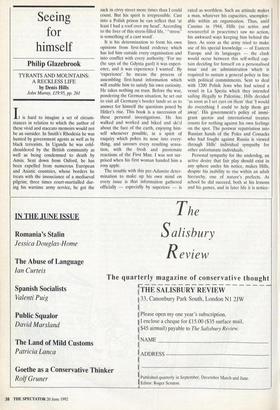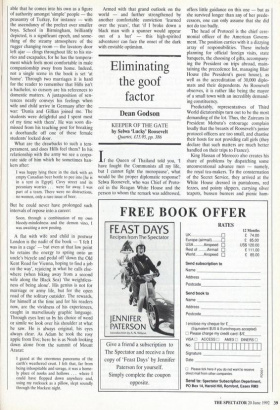Seeing for himself
Philip Glazebrook
TYRANTS AND MOUNTAINS: A RECKLESS LIFE by Denis Hills John Murray, £19.95, pp. 261 It is hard to imagine a set of circum- stances in relation to which the author of these vivid and staccato memoirs would not be an outsider. In Smith's Rhodesia he was hunted by government agents as well as by black terrorists. In Uganda he was cold- shouldered by the British community as well as being condemned to death by Amin. Sent down from Oxford, he has been expelled from numerous European and Asiatic countries, whose borders he treats with the insouciance of a mediaeval pilgrim; three times court-martialled dur- ing his wartime army service, he got the
sack in ciwy street more times than I could count. But his spirit is irrepressible. Cast into a Polish prison he can reflect that 'at least I had a roof over my head'. According to the liver of this stress-filled life, "stress" is something of a cant word'.
It is his determination to form his own opinions from first-hand evidence which has led him outside every organisation and into conflict with every authority. 'For me (he says of the Gdynia gaol) it was experi- ence, and it was experience I wanted'. By 'experience' he means the process of assembling first-hand information which will enable him to satisfy his own curiosity. He takes nothing on trust. Before the war, pondering the German situation, he set out to visit all Germany's border lands so as to answer for himself the questions posed by Hitler's rise. This book is a succession of these personal investigations. He has walked and worked and biked and ski'd about the face of the earth, enjoying him- self whenever possible, in a spirit of enquiry which pokes its nose into every- thing, and savours every resulting sensa- tion, with the fresh and passionate reactions of the First Man. I was not sur- prised when his first woman handed him a rosy apple.
The trouble with this pre-Adamite deter- mination to make up his own mind on every issue is that information gathered officially — especially by superiors — is rated as worthless. Such an attitude makes a man, whatever his capacities, unemploy- able within an organisation. Thus, until Cassino in 1944, Hills (so active and resourceful in peacetime) saw no action, his awkward ways keeping him behind the lines. As soon as the army tried to make use of his special knowledge — of Eastern Europe and its languages — the clash would occur between this self-willed cap- tain deciding for himself on a personalised issue and an administration which is required to sustain a general policy in line with political commitments. Sent to deal with 1200 Polish Jews who had seized a vessel in La Spezia which they intended sailing illegally to Palestine, Hills decided 'as soon as I set eyes on them' that 'I would do everything I could to help them get away'. His government's policy of immi- grant quotas and international treaties counts for nothing against his own feelings on the spot. The postwar repatriation into Russian hands of the Poles and Cossacks who had fought against Russia is viewed through Hills' individual sympathy for other unfortunate individuals.
Personal sympathy for the underdog, an active desire that fair play should exist in any sphere under his notice, makes Hills, despite his inability to rise within an adult hierarchy, one of nature's prefects. At school he did succeed, both at his lessons and his games, and in later life it is notice- able that he comes into his own as a figure of authority amongst 'simple' people — the peasantry of Turkey, for instance — with the ascendancy of the prefect over smaller boys. School in Birmingham, brilliantly depicted, is a significant epoch, and some- thing of the steamy atmosphere of the rugger changing room — the lavatory door left ajar — clings throughout life to his sto- ries and escapades, for he has the tempera- ment which feels most comfortable in male companionship away from home. Indeed, not a single scene in the book is set 'at home'. Through two marriages it is hard for the reader to remember that Hills isn't a bachelor, so cursory are his references to domestic matters. A juxtaposition of sen- tences neatly conveys his feelings when wife and child arrive in Germany after the war: `Dunia and Gillian joined me. The students were delightful and I spent most of my time with them'. He was soon dis- missed from his teaching post for breaking a doorhandle off one of these female students' locked door.
What are the drawbacks to such a tem- perament, and does Hills feel them? In his relationship with the army we see a corpo- rate side of him which he sometimes han- kers after:
I was happy lying there in the dark with an empty Canadian beer bottle to pee into [he is in a tent in Egypt]. Ciwy street and its pecuniary worries . .. were far away. I was part of a team. There were no distractions, no women, only a rare issue of beer.
But he could never have prolonged such intervals of repose into a career:
Soon, through a combination of my own bloody-mindedness and the demon vino, I was awaiting a new posting.
A flat with wife and child in postwar London is the nadir of the book — 'I felt I was in a cage' — but even at that low point he retains the energy to spring onto an uncle's bicycle and pedal off 'down the Old Kent Road for Vienna, hoping to find a job on the way', rejoicing in what he calls else- where (when biking away from a second wife along the Black Sea) 'the weightless- ness of being alone'. His genius is not for marriage or army life, but for the open road of the solitary outsider. The rewards, for himself at the time and for his readers now, are the vividness of his experiences, caught in marvellously graphic language. Through eyes lent us by his choice of word or simile we look over his shoulder at what he saw. He is always original, his eyes always clear. As Adam he took the rosy apple from Eve; here he is as Noah looking down alone from the summit of Mount Ararat: I gazed at the enormous panorama of the earth's weathered crust. I felt that, far from being inhospitable and savage, it was a home- ly place of nooks and hollows . . . where I could have flopped down anywhere and, using my rucksack as a pillow, slept soundly through the blackest night. Armed with that grand outlook on the world — and further strengthened by another comfortable conviction 'learned over the years', that 'if I broke down a black man with a spanner would appear out of a hut' — this high-spirited adventurer can face the onset of the dark with enviable optimism.



























































 Previous page
Previous page